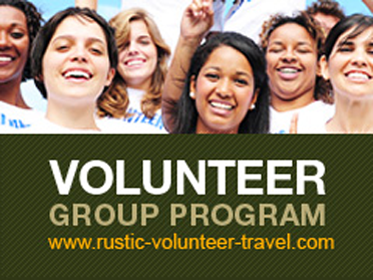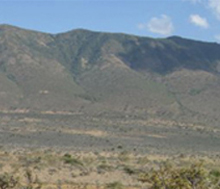
A Life-Changing, Rewarding and Affordable Kenyan Maasai Experience!

Volunteer in Kenya Maasai, and experience the opportunity of a lifetime! What better place to volunteer than the original safari destination? Kenya is overflowing with excitement for explorers, adventurers and travelers with its tropical beaches, coral reefs, snow-capped mountains, unparalleled wildlife, enchanting landscapes and rich culture. Volunteer in Kenya Maasai and become immersed in the colorful tribal life of the Maasai people of Kenya. The Maasai people and way of life face many threats ranging from globalization, the HIV/AIDS epidemic and over-grazing of land, which has led to food shortages.
Rustic has partnered with a local nonprofit organizations dedicated to improving the standard of living of the indigenous Maasai people while at the same time, preserving their culture. Volunteer in Kenya and help enrich the lives of the Maasai people and help them document and preserve their culture and heritage. Don't miss this opportunity to volunteer with this unique tribe of people.
To begin your African journey now, email us for more information! We will be happy to send you more information so you can soon travel to an astonishing country and improve the lives of those you touch.
Contact Rustic Volunteer now and we will gladly send you additional information about our programs to volunteer in Ghana. The sooner you contact us, the sooner you can begin the adventure of a lifetime and make a difference in the world!
get more informationAll volunteer programs start on the first and third Monday of each month.
If you are tired of expensive volunteer programs but want to make a positive contribution in the world, look no further! Rustic is dedicated to offering high-quality, well-organized and meaningful programs at the most affordable price in the United States. We work hard to keep costs as low as possible, focusing on the effectiveness of our projects, the safety of our volunteers and the quality of participant experiences. We currently offer the most competitive price possible in today's market including an application fee (of $299) AND a small weekly fee as follows:
| 1 Week | 2 Wks | 3 Wks | 4 Wks | 5 Wks | 6 Wks | 7 Wks | 8 Wks | 9 Wks | 10 Wks | 11 Wks | 12 Wks |
| $150 | $250 | $350 | $450 | $550 | $650 | $750 | $850 | $950 | $1050 | $1150 | $1250 |
Mandatory Comprehensive Travel Insurance $3.49/day
Airport pick up/transfer (45 miles) $50 Nairobi
Airport pick up/transfer (75 miles) $75 masai
Summer volunteer and adventure (4 weeks include safari) $2269
Volunteer as an English teacher in Maasai Land in Kenya and help enhance the futures of your students! There is a lack of teachers in most schools villages in the Maasai region. The Kenyan education system recently went through major changes and free education is now provided to the primary level. More students are now going to school, but there is a shortage of teachers in the public schools of Maasai Land. To fill this gap, your contribution as a volunteer teaching English would be highly appreciated by Kenyans. The Maasai students are eager to learn and greatly appreciate our volunteers. Rustic Volunteer currently partners with local schools to place volunteers in a number of roles from teaching formal to informal English programs in Kenya. This is a great opportunity to travel to an astonishing country, engage in a very unique and colorful culture, gain professional experience and enrich Kenyan education.
School will remain closed in Kenya in Apr-May and Aug-Sep. Volunteers can join other projects during this time.
As a volunteer teaching English in Maasai Land in Kenya, your job responsibilities may vary depending on the needs of each school (secondary or primary). Volunteers work mostly as an assistant to the main English teacher. Daily activities may include:
There are no specific skills or requirements necessary to volunteer teaching English in the Maasai region of Kenya. You do not need previous teaching experience or a degree in teaching to enroll in the project. However, you should be a fluent English speaker (if you’re not a native English speaker) and be flexible, as working in Kenya and with the Maasai people will be very different from working back home.
Because of their remote location, one of the largest challenges the Maasai people face is the lack of medical knowledge, professionals and education. Rustic Volunteer has partnered with a local medical center in the Maasai region to provide volunteers who have the ability and want to share their knowledge, time, skills and talents with local healthcare staff. Volunteers are needed to conduct information sessions on preventable diseases such as HIV/AIDS, malaria, influenza or tuberculosis. As a healthcare volunteer working in the Maasai region in Kenya, you will have tremendous opportunities for exciting personal and professional experiences that will affect your life and career. This is the perfect project for volunteers to immerse themselves into another culture and provide a positive contribution to a community where the need is the greatest.
Each volunteer in Kenya working in the healthcare/medical project in the Maasai region will have varying responsibilities and tasks. Volunteer projects will depend on one’s qualifications and certifications as a medical professional. Duties may include:
Rustic Volunteers/travelers interested in joining the volunteer health program must possess a healthcare certification such as an ID as a medical student, EMT or paramedic certification, or nursing or physician's credentials. Medical volunteers without credentials are not allowed to work in this program because of the potential risk. The health centers require a copy of your resume clearly stating credentials and education before your arrival to the project.
As a volunteer in the Community Development Project in the Maasai region, you may work on a variety of projects including HIV/AIDS education, other public health education programs, women and children's programs, building projects, tourism and marketing of local crafts or other similar projects. Volunteers may also assist in planning future community projects and fundraising efforts. Rustic Volunteer is currently partnering with local nonprofit organizations by placing volunteers to assist in these community development initiatives. This project can customize individual skills and interests of the volunteers to match the needs of local projects. This way, volunteers can gain career-related experience while effectively enriching the lives of the Maasai people.
Each volunteer in the Maasai Community Development Project in Kenya may participate in a variety of activities related to community development, depending on individual skills and interests and the needs of local organizations. This project can also be combined with other Maasai volunteer programs, such as the Teaching English program. Daily activities may include, but are not limited to:
To volunteer in the Maasai Community Development program in Kenya, volunteers should be genuinely interested and committed to the Maasai culture and work hard to improve the lives of poor people. Projects may be tailored to the volunteer's interests and skills. If you're open minded and flexible during the project, you'll enjoy your stay and achieve more.
The recent difficulties faced by the Maasai people have caused many to abandon their traditional life and move to urban areas. Join the Cultural Conservation Volunteer Project in the Maasai region of Kenya and work with the Maasai people on ways to preserve and expand awareness of the importance of culture. The Maasai people have a unique culture and love to share their traditions and history with visitors. The Maasai need volunteers to help document their current culture and traditions. Volunteers collaborate with the Maasai people on methods to preserve and document their traditions. Maasai people are also interested to learn about Western culture and volunteers are encouraged to respectfully share their culture and ideas. This is a great opportunity to travel to Kenya and engage in a meaningful cultural exchange.
As a volunteer working in the Cultural Conservation Volunteer Project in the Maasai region of Kenya, you will engage in the community and participate in a variety of projects. Daily activities will include, but are not limited to:
There are no specific skills or qualifications needed to join the Maasai culture project other than fluency in the English language as well as a desire to document and preserve the Maasai culture. Projects may vary and can be tailored to fit the skills of the volunteer. Volunteers are expected to be flexible and patient. Volunteering in this program can be combined with other Maasai volunteering to round out your Maasai experience.
Rustic Volunteer arranges volunteer meals, accommodations and strong field supervision for the duration of projects and optional travel packages. In Kenya, most volunteers stay with a local Maasai host family. Host family accommodations are simple and clean homes, typically small huts or metal houses. Volunteers usually have a private bedroom, but occasionally rooms will be shared with a same-gender volunteer. Our host families are well screened and are respected members of their communities. Most of our host families have experience hosting international volunteers. Host family stays are a great chance for cultural immersion and exchange.
Volunteers receive three local meals per day (breakfast, lunch and dinner). We can provide vegetarian meal options, but needs must be detailed in a volunteer's application. Snacks and beverages outside of mealtimes are not provided.
Rustic offers unparalleled field support to volunteers to ensure a safe and rewarding experience. There are many layers of support for you. The most important support comes from our country coordinator/field staff. The secondary support comes from the host project staff and members of host family. Volunteers will have access to our country coordinator's mobile number and they are available 24/7. Throughout the volunteer project, our local staff stays in contact with volunteers either with face-to-face visits or via email/telephone. Our field staff will visit regularly (every 2-4 weeks) to make sure things are going well and as planned. However, if placement is far from our local offices, staff members will stay in touch via email/ phone. Volunteers are also welcome to stop in the offices at any time.
Specific details regarding accommodations, food and contact details for our local coordinator will be provided in personalized volunteer placement documentation prior to arrival.
get more information Rustic Volunteer in Kenya projects are available in Kimuka and the surrounding Maasai villages in rural Kenya. Maasai villages are small and remotely located in the dry savannah and surrounded by beautiful hills. Volunteers will work and live in basic Maasai huts and metal buildings. Volunteers are surrounded by the scenery of the Rift Valley and the surrounding Ngong Hills. Kimuka is located 30 km west of Nairobi. Volunteers can organize several combinations of potential excursions during and after the project to visit places of interest. There is a tourist infrastructure already in place in Kenya that the volunteers can take advantage of during free-time and weekends. Weekend excursions in Kenya can include national parks, safari excursions, markets, museums, restaurants, tourist villages, mausoleums, art galleries, golf courses, crocodile farms, nature trails, hotels, Bombolulu workshops and much more.
Rustic Volunteer in Kenya projects are available in Kimuka and the surrounding Maasai villages in rural Kenya. Maasai villages are small and remotely located in the dry savannah and surrounded by beautiful hills. Volunteers will work and live in basic Maasai huts and metal buildings. Volunteers are surrounded by the scenery of the Rift Valley and the surrounding Ngong Hills. Kimuka is located 30 km west of Nairobi. Volunteers can organize several combinations of potential excursions during and after the project to visit places of interest. There is a tourist infrastructure already in place in Kenya that the volunteers can take advantage of during free-time and weekends. Weekend excursions in Kenya can include national parks, safari excursions, markets, museums, restaurants, tourist villages, mausoleums, art galleries, golf courses, crocodile farms, nature trails, hotels, Bombolulu workshops and much more.





